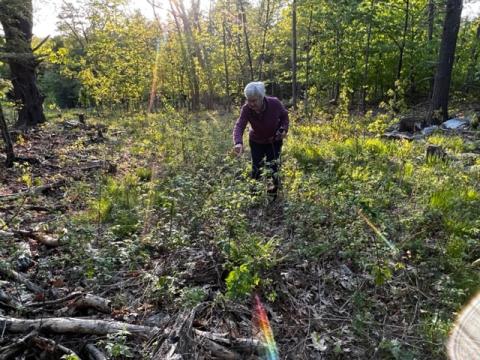Land as Wildlife Habitat: Trish Leipold Shares Her Story

Women in the Woods is a collaboration between UNH Cooperative Extension, NH Timberland Owners Association, the Society for the Protection of New Hampshire Forests, and other partners aimed at connecting women forest landowners, managers, and stewards with the resources, skills, and community they need to make informed stewardship decisions that promote healthy forest resources. As part of this effort, we are sharing the perspectives of women landowners and managers in New Hampshire.
Name: Trish Leipold
Acres owned: 93
Town: Wolfeboro, NH
When did you acquire your land and how? What is the story of how you came to be a landowner?
We purchased the land with our current home in 1994. As we realized the variety of wildlife and habitats on the property, we became interested in learning more about optimizing these habitats. In particular, we were aware that migratory woodcock were using our property as a singing ground in spring for courtship. As the woods matured, it became apparent the woodcock usage was diminishing. We learned about and signed up for the NH Coverts Project. This proved to be an extremely valuable source of information, resources, and knowledgeable people. After this experience we decided to manage the land for young forest habitat.
Do you have a favorite memory from your land?
My favorite times are when we are witnessing and sharing the woodcock sky dance with others or when one of the dogs points a female on her ground nest. It is also always fun to find bobcat, grouse, snowshoe hare, and other prints in the snow. Sitting with coffee or wine listening to the increased variety of song birds using the property can be magical and very rewarding. We also have had a whippoorwill every summer. This is another species with concerns of declining populations.
"My favorite times are when we are witnessing and sharing the woodcock sky dance with others or when one of the dogs points a female on her ground nest. "
What are some ways that you connect with your land? What do you like to do on your land?
We walk or snowshoe on the property almost daily with our dog. We have also been learning tree, shrub, and wildflower identification with a retired forester and occasionally bring groups on the property to share the knowledge and the reasons for managing the woods.
What are some challenges or learning opportunities that owning your land has presented you?
The challenges always include the invasive species that have become an unfortunate reality. Having done the management with 2 large patch cuts 6 years apart, I have been amazed at the increased number of species, particularly of song birds, that we hear and see. It has been dramatic to so quickly realize the benefits of early successional habitat for wildlife.
What excites you about your land in the future?
Knowing that early successional habitat is limited in NH, woodcock is a species of concern, and many song birds have declining populations, I am very excited to see the difference this land management has made. I am hopeful that we are helping to educate others about this importance.
What does your land mean to you?
Our land has been an oasis of peace and tranquillity for the nearly 30 years since we purchased it. This became even more important through the COVID-19 isolation. However, I had more time to learn about New Hampshire forests, wildlife, and wildflowers and this little oasis offers so many opportunities for discovery and learning. It has added a richness I had never anticipated.
"Our land has been an oasis of peace and tranquility for the nearly 30 years since we purchased it."
If there was one thing you could share with other women landowners, what would it be?
It is wonderful to discover the secrets of your property, manage it for improved wildlife habitat, and realize that you can make positive changes for these species. Before you plan a traditional garden (as I originally did), study and consider what native plants would benefit the wildlife species that were here naturally.
Funding for this program is provided by a Landscape Scale Restoration Grant, U.S. Forest Service.
Are you interested in learning more about Women in the Woods and upcoming events?
Sign up for our newsletter to receive updates.
